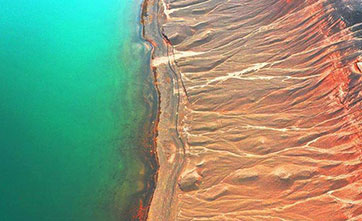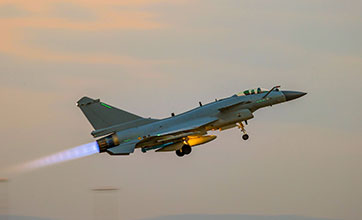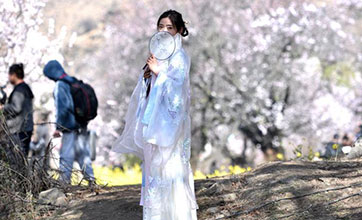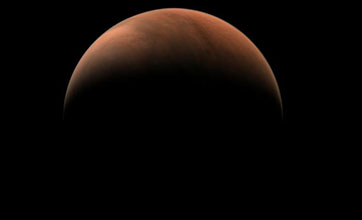Vienna talks "constructive," raising hope to restore Iran nuclear deal
VIENNA, April 6 (Xinhua) -- The Joint Comprehensive Plan of Action (JCPOA) Joint Commission meeting, resumed here on Tuesday, was hailed by attending envoys as "constructive" and is expected to bring more hope for the revival of the Iran nuclear deal.
With the lifting of sanctions on Iran and nuclear implementation measures at the top of the agenda, the meeting has drawn worldwide attention as delegates from the United States joined the talks to save the nuclear deal, which was struck in 2015 but paralyzed by the U.S. withdrawal in 2018.
INDIRECT U.S.-IRAN TALKS
Senior diplomats of Britain, China, France, Germany, Russia and Iran met at a Viennese hotel on Tuesday behind closed doors, which were chaired by Enrique Mora, deputy secretary-general and political director of the European External Action Service.
Local media reported that the U.S. delegation, led by U.S. Special Envoy to Iran Robert Malley, was based in a nearby hotel.
The U.S. and Iranian negotiators were not supposed to meet face-to-face, but a shuttle diplomacy approach was adopted with the intensified help of the coordinators.
Prior to Tuesday's meeting, Iran's chief nuclear negotiator Abbas Araqchi said he would "not hold any direct or indirect talks" with U.S. representatives but would only negotiate with the Joint Commission of the JCPOA.
Mora said on Twitter following the meeting that it was a "constructive Joint Commission meeting."
"There's unity and ambition for a joint diplomatic process with two expert groups on nuclear implementation and sanctions lifting. As Coordinator I will intensify separate contacts here in Vienna with all relevant parties, including the U.S.," he said.
Russia's delegate Mikhail Ulyanov tweeted that the meeting was "successful."
"The restoration of JCPOA will not happen immediately. It will take some time. How long? Nobody knows," he wrote. "The most important thing after today's meeting of the Joint Commission is that practical work towards achieving this goal has started."
Walter Posch, an Austrian expert on Iran, told Austria Press Agency that the fact that talks were held in Vienna to revive the crippling nuclear agreement, albeit indirectly, was already a success.
Wang Qun, Chinese envoy to the United Nations and other international organizations in Vienna, said after the meeting that China supports the Joint Commission's efforts to set up two expert-level groups, one on sanctions-lifting and nuclear implementation, while the other on "proximity talks" with the United States.
China hopes the two groups can make progress as soon as possible, he said.
China continues to unswervingly uphold the JCPOA, Wang said, urging all parties to increase their sense of urgency, seize the current opportunities, and push the JCPOA back on track through fair and reasonable negotiations.
SANCTIONS REMOVAL CRUCIAL
According to the Iranian foreign ministry, the Vienna talks included "technical negotiations in the form of expert meetings" in order to figure out how U.S. sanctions can be lifted and how Iran can come back into full compliance with the deal.
The official Islamic Republic News Agency reported that Araqchi told the commission meeting Tuesday that lifting U.S. sanctions is the first and most necessary step to revive the 2015 nuclear deal.
The JCPOA was reached in 2015 between Iran and the P5+1 (the five permanent members of the United Nations Security Council -- the United States, Britain, Russia, France, China, plus Germany) and the European Union. Tehran agreed to roll back parts of its nuclear weapons program in exchange for decreased economic sanctions.
Washington under former President Donald Trump withdrew from the JCPOA in 2018 and tightened sanctions on Iran.
The United States and Iran are in a standoff over reviving the nuclear deal. U.S. President Joe Biden's administration said that if Iran returns to full compliance with the JCPOA, the United States would do the same. But Iran insisted its compliance would only take place once U.S. sanctions were removed.
Washington said on Monday that its goal of the talks was to set the stage for a mutual return to compliance with the 2015 accord but did not anticipate an immediate breakthrough.
U.S. State Department spokesman Ned Price said the talks are a "healthy step forward" but "we don't anticipate an early or immediate breakthrough, as these discussions, we fully expect, will be difficult."
Wang, the Chinese envoy, said Tuesday that Washington should lift all unlawful sanctions against Tehran, and the Iranian side should resume full compliance with the 2015 nuclear deal on that basis.
Wang said the status of the Iranian issue is undoubtedly attributable to the U.S. pullout of the JCPOA, and its maximum pressure policy towards Iran. Therefore, the early return of the United States to the accord is the key to cracking the current situation.
"This is a question involving the fundamental principle of rights and wrongs. As a victim, Iran's legitimate requirement should, in the first place, be affirmed and catered for," Wang said.
"The U.S. should, if it is serious, lift all its unlawful sanctions against Iran, in the meantime, abolish all its long-arm jurisdiction measures against entities and individual in third countries including China," he said.
Photos
Related Stories
- Iran nuclear deal talks resume in Vienna, sanctions lifting on agenda
- Iran not to hold "direct or indirect" talks with U.S. in Vienna: chief negotiator
- Iran reports 11,750 new COVID-19 cases, 1,897,314 in total
- Iran tops 10,000 new single-day COVID-19 cases as vaccination campaign unfolds
- Russia sees "encouraging signs" from U.S. on Iran nuclear deal revival
Copyright © 2021 People's Daily Online. All Rights Reserved.










